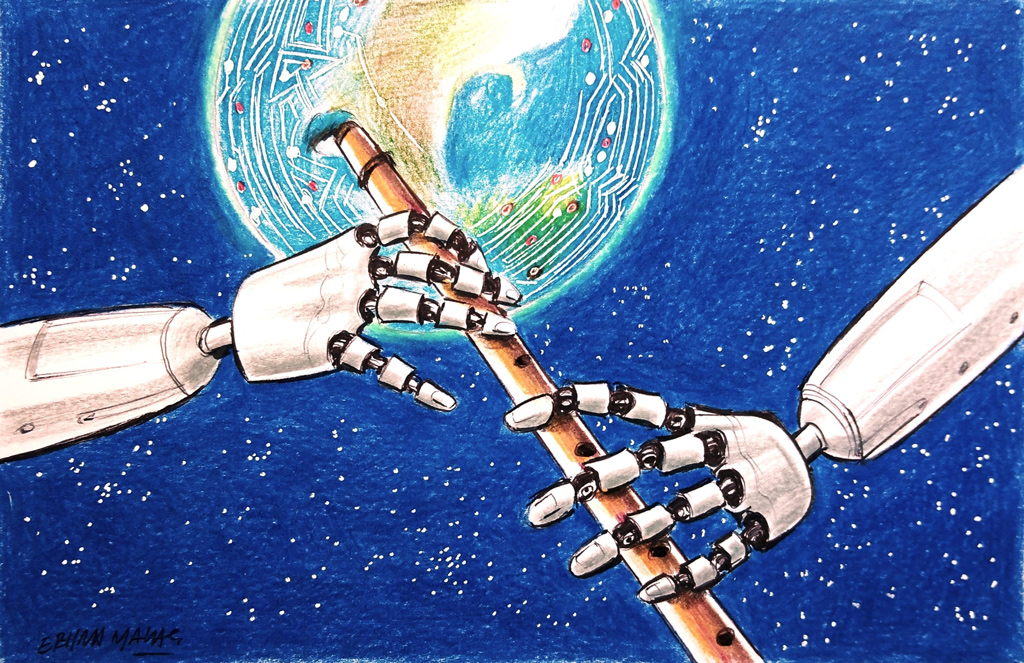When Apple incorporated Siri into its systems in 2011, it was considered a milestone in Artificial Intelligence (AI) development. This achievement marked the culmination of extensive research and development in natural language processing (NLP) and voice recognition technologies, demonstrating significant advancements in making AI more accessible and user-friendly to everyday consumers.
Another milestone was announced on June 10, 2024, when Apple, with over 2.2 billion active devices worldwide, revealed its partnership with OpenAI to integrate ChatGPT into its devices. Apple also unveiled a new "Apple Intelligence" system, set to be incorporated into all Apple devices within a few months.
When we examine the new features of this system, it becomes evident that we are rapidly advancing toward personalized AI. Soon, our phones will no longer be merely communication devices but will evolve into personal assistants with the primary aim of making our lives easier. Yet, nothing comes without a price, and this time, the cost may not be monetary.
Latest Innovations Presented by Apple
First and foremost, Apple announced its partnership with OpenAI, meaning that ChatGPT will be integrated into most Apple systems, including Siri and writing tools, which allow you to create content, including images. This integration implies that if approved by the user Siri will be able to tap into ChatGPT's expertise without needing to open a separate app. For instance, if we ask Siri a question, Siri can consult ChatGPT for an answer, enhancing its ability to provide accurate and detailed responses.
At the same time, Apple unveiled the so-called "Apple Intelligence" system, which promises to revolutionize user interaction with devices through personalized AI features. That means our present devices will become more intuitive and tailored to individual needs and preferences. As demonstrated in the videos released by Apple, Siri, for example, could recognize who our mom is based on the data on our phone. It will also remember our plans with her for the day and offer reminders.
Furthermore, just by giving a simple prompt, our devices – which are well aware of who is in our gallery – will be able to create videos of our children playing in the playground by classifying and choosing among thousands of images.
These are just a few examples of what the new Apple Intelligence system will be able to do. Overall, we can keep in mind that these updates are designed to provide a more seamless and user-friendly experience, with AI enhancements that simplify daily tasks and improve overall device performance by personalizing the technology and tailoring it to our needs. While we were all talking about general AI, we now find ourselves discussing tailored and personal AI, which is even more impactful.
What Is the Price for Making Life Easier?
As stated, these new updates will transform our devices into personal assistants capable of helping with everyday tasks. However, a crucial aspect of this transformation is that the system needs to use and learn from our personal data, including detailed information about our family, friends, and activities. While Apple announced that Apple Intelligence will leverage cloud-based models on special servers using Apple Silicon to ensure user data is private and secure, the growing reliance on such data raises significant privacy concerns.
Despite Apple's assurances, the threat to data privacy has never been greater. In an era where data breaches and cyber threats are growing, protecting personal information is more critical than ever. While the benefits of personalized AI are clear, it is essential to remain vigilant about the potential risks associated with the collection and use of sensitive personal data.
Another important issue is our growing dependency on these new technologies. To illustrate this, consider how we used to memorize the phone numbers of our close contacts, whereas now we rely on our phones to store this information. If we were to lose access to these numbers for a few hours, it would become obvious how dependent we are on our phones and the services they provide.
This dependency will only grow with the advent of new phones that will serve as personal assistants soon. As these devices take over tasks like writing, organizing our activities, and more, our reliance on them will increase, significantly impacting our daily lives.
It is crucial to understand that while these new developments offer numerous advantages and conveniences, they also bring new threats that we must be aware of. Increased dependency on technology can make us vulnerable, and we must remain mindful of the potential risks associated with entrusting our personal and professional lives to these devices. The key is to strike a balance between leveraging the benefits of advanced technologies and maintaining awareness of the security and privacy implications they entail.
‘Cold War’ between Big Tech Companies
With Apple announcing this new system, several debates have come to the forefront, one of the most significant being the ongoing rivalry among big tech companies. For a long time, tech giants like Alphabet, Microsoft, Amazon, and Meta have been racing to develop new AI-driven products while competing with – or in some cases, partnering with – startups focused on AI, like OpenAI.
In this competitive landscape, Apple had lagged behind, showing reluctance to prominently feature AI in its services and instead focusing on machine learning. This strategy left Apple trailing its major competitors. At the beginning of 2024, after being surpassed by Microsoft as the world's most valuable company in January, Apple was overtaken again by Nvidia in early June.
Moreover, in January 2024, one of Apple's main rivals, Samsung, unveiled its new line of Galaxy S24 smartphones with advanced AI capabilities. Similar to Apple’s cooperation with OpenAI, Samsung announced its collaboration with Google, indicating they would use Google’s Large Language Model (LLM) Gemini, a competitor to ChatGPT, offering features similar to those presented by Apple.
In such a competitive environment, Apple was compelled to directly announce and incorporate AI into its devices. While this move is understandable within our economic system, it has broader implications for technological development as a whole.
Another significant development highlighting the issues within this competitive, decentralized environment was Elon Musk’s recent announcement. Musk, who has been in direct conflict with OpenAI CEO Sam Altman, said, "If Apple integrates OpenAI at the OS level, then Apple devices will be banned at my companies. That is an unacceptable security violation."
To understand the repercussions of this “cold war” between tech companies, we need to know that for some time now, the technological revolution that is redefining our world has been driven by big tech companies rather than governments, as it was in previous decades. This means that pure economic motives drive the current technological revolution, with little thought to its repercussions.
Every day we are witnessing new technological developments, which are becoming increasingly difficult to keep up with. This rapid pace poses a real risk of the technology advancing beyond our control. Specifically, as these new technologies evolve at breakneck speed, necessary developments like regulations are moving much more slowly, putting people's lives, the environment, and even international relations at unprecedented risk.









